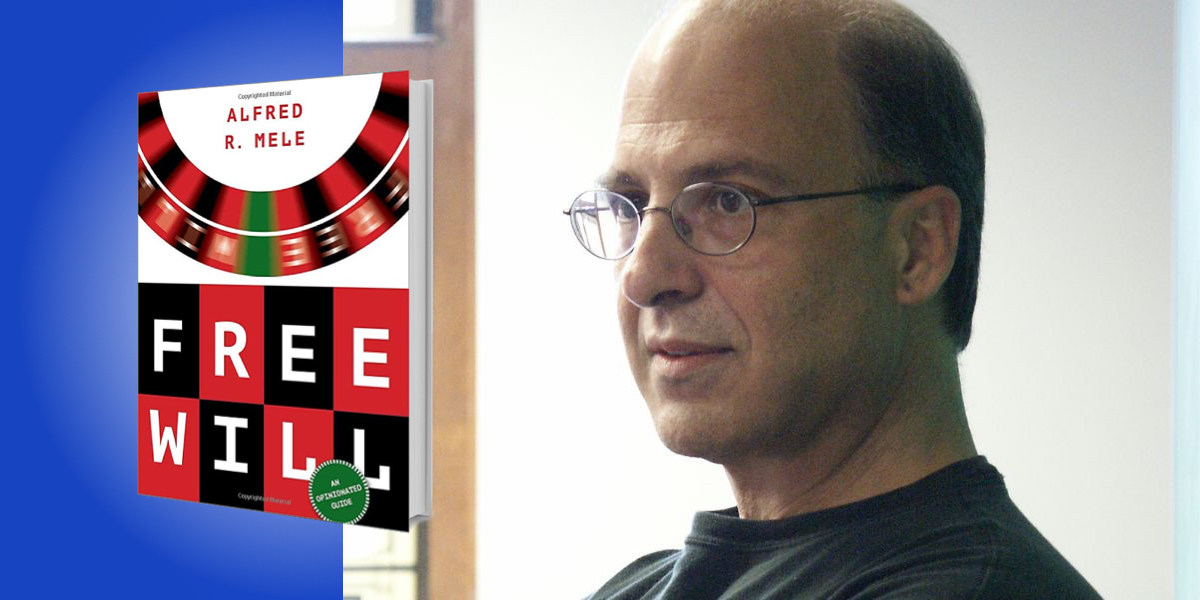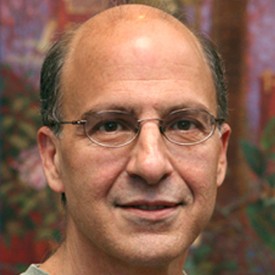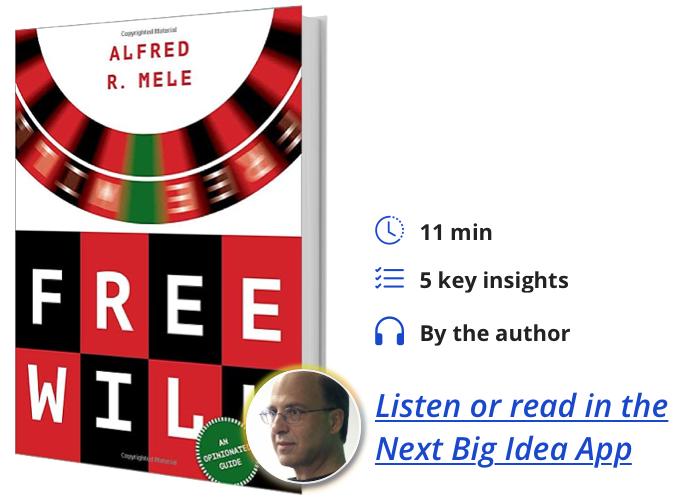Alfred Mele is a Professor of Philosophy at Florida State University, the past director of the Big Questions in Free Will project and the Philosophy and Science of Self-Control project, and a current member of the Neurophilosophy of Free Will project.
Below, Alfred shares 5 key insights from his new book, Free Will: An Opinionated Guide. Listen to the audio version—read by Alfred himself—in the Next Big Idea App.
1. Free will is for everyone.
Philosophical and scientific writing on free will can be complicated, but anyone interested in the topic can achieve understanding when ideas are explained simply, without sacrificing accuracy. I have found that thought experiments are useful for this purpose. The thought experiments I use are mainly science-fiction mini-stories of my own creation. In this way, some of the deepest questions about free will are made vivid and motivate readers to think about how big questions should be answered. Readers will come away from this book with a good understanding of the main positions philosophers and scientists have taken on free will, the reasoning behind their positions, and the pros and cons of competing ideas.
2. Sometimes you don’t have to choose.
Philosophers are divided into two broad camps on free will. There are those who claim that free will and determinism can coexist, and those who reject this claim. Both sides are deeply entrenched. I have developed one theory of free will for those on one side of the divide and another theory for those on the other side. It is more credible that we at least acknowledge free will of one kind or the other, rather than dismiss free will as an illusion. Some of you are probably thinking that it is self-contradictory to say free will and determinism can coexist. That depends on how determinism is defined.
“Some of the deepest questions about free will are made vivid and motivate readers to think about how big questions should be answered.”
3. Moral responsibility brings free will down to Earth.
Like many philosophers, I believe that free will is closely tied to moral responsibility—deserving of either blame or credit from a moral point of view. If we didn’t have free will, we wouldn’t be morally responsible for anything. Think about Vladimir Putin. Do you regard some of his recent behavior as morally reprehensible? Do you hold him morally responsible for authorizing vicious attacks on Ukrainian civilians? If so, you believe in free will. If Putin didn’t authorize those attacks of his own free will, how could he deserve moral blame for doing so? If eventually, he faces punishment, how could he deserve the punishment? Linking free will to moral responsibility discourages inquiring minds from accepting extravagant ideas about what free will is supposed to be.
4. Watch out for questionable bar setting.
Some people are confident that free will exists, while others are equally confident that it doesn’t. In reflecting on why they believe what they do, it is useful to think in terms of where they set the bar for free will, and why. Some may assume that having free will is dependent on having an immaterial soul or the ability to violate laws of nature, whereas others think that an ability to make well-informed rational decisions in the absence of coercion is good enough. These two camps are placing the bar for free will at very different heights.
“Linking free will to moral responsibility discourages inquiring minds from accepting extravagant ideas about what free will is supposed to be.”
One part of a multi-pronged strategy for figuring out where to set the bar for free will uses a relatively recent development called experimental philosophy. In this technique, non-specialists read various vignettes and ask themselves questions about whether the characters are acting freely and whether they are morally responsible for their actions. Interesting findings have come from examining connections between bar setting and arguments against the possibility of free will.
5. Neuroscientific arguments against free will are flimsy.
Various experiments performed by neuroscientists are often cited as proof that free will is an illusion. The research on this topic is ongoing, as is reporting on it in the popular press, where one finds headlines such as Why Scientists Now Believe that Free Will is an Illusion and There’s No Such Thing as Free Will. There is some evidence that lowering people’s confidence in the existence of free will increases misbehavior. And some people find the alleged news that free will doesn’t exist depressing. My e-mail inbox is full of messages from people who are deeply troubled by the thought that they don’t have free will. Here is the first such message I received:
Dear Dr. Mele,
I recently purchased a DVD by Dr. Stephen Wolinsky. . . He explains from the point of [view of] neuroscience that there is no such thing as free will, as we can only perceive an action after it has already occurred. Can you please help me with this? I can understand that I don’t know what thought will occur next. But that that has already happened is beyond comprehension. Thank you as I am in a lot of despair.
The good news is that the data produced by these experiments does not support the conclusion that free will is an illusion.
To listen to the audio version read by author Alfred Mele, download the Next Big Idea App today:
































